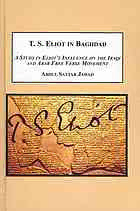
T.S. Eliot in Baghdad : a Study in Eliot's Influence on the Iraqi and Arab Free Verse Movement PDF
Preview T.S. Eliot in Baghdad : a Study in Eliot's Influence on the Iraqi and Arab Free Verse Movement
T.S. ELIOT IN BAGHDAD A Study in Eliot's Influence on the Iraqi and Arab Free Verse Movement T.S. ELIOT IN BAGHDAD A Study in Eliot's Influence on the Iraqi and Arab Free Verse Movement Abdul Sattar Ja wad With a Foreword by Joseph Donahue The Edwin Mellen Press Lewiston· Lampeter Library of Congress Cataloging-in-Publication Data Jawad, 'Abd al-Sattar, author. T.S. Eliot in Baghdad: a Study in Eliot's Influence on the Iraqi and Arab Free Verse Movement I Adbul Sattar Jawad ; with a foreword by Joseph Donahue. p. cm. Includes bibliographical references and index. ISBN-13: 978-0-7734-0074-0 (hardcover) ISBN-I0: 0-7734-0074-S (hardcover) 1. Eliot, T.S. (Thomas Stearns), 1888-196S--lnfluence. 2. Eliot, T.S. (Thomas Steams), 1888-1968--Appreciation--Iraq. 3. Arabic poetry- Iraq--Baghdad--History and criticism. 4. Arabic poetry--20th century- History and criticism. S. Free verse--History and criticism. I. Title. PS3S09.L43Z68478 2014 821'.912--dc23 20130S0S0S hors serie. A CIP catalog record for this book is available from the British Library. Front cover image designed by Jennifer Prather. Copyright © 2014 Abdul Sattar Jawad All rights reserved. For information contact The Edwin Mellen Press The Edwin Mellen Press Box 4S0 Lampeter Lewiston, New York Ceredigion, Wales USA 14092-04S0 UK SA488LT Printed in the United States of America To Gil Merkx for his constant support and considerable assistance, for his intelligence and big heart TABLE OF CONTENTS Foreword by Joseph Donahue .................................... .i 1-Eliot's Influence on the Iraqi Free Verse Movement.. ..... 1 I: The Battle Between Tradition and Modernity ...... l II: The Reception of "The Waste Land" ................ 8 III: The Poem of the Century .......................... .14 IV: Reading "The Waste Land" ........................2 0 V: Translating "The Waste Land" ..................... 35 2- Eliot's Children or The Wastelanders ...................... .43 I: The Quest for National Salvation ................... .43 II: AI-Sayyab (1926-1964) ............................. .45 III: The Golden Bough-From Ritual to Romance ..... 57 IV: AdonislTammuz ..................................... 60 3-J abra Ibrahim J abra .......................................... 103 I: The Clash of Literary Genres .................. , .... 103 II: In Defense of Poesy ................................ .113 III: Jabra and AI-Sayyab ............................... 117 4-Yusuf AI-Khal ................................................ 137 I: The Launching of Shi'rMagazine ................. 137 II: The Literary Climate ofthe Forties and Fifties.l45 III: Al-Khal's Translation of "The Waste Land" .. .l49 IV: Shi 'r Magazine ............................................... 151 V: The Prose Poem .................................... .l56 5- Khalil Hawi ................................................... 177 I: A Poet of Pessimism ................................. 178 II: Hawi and Eliot.. ..................................... 181 . III: Hawi and the Myth ofTammuz .................. 187 IV: Lazarus ..............................................2 05 6-Adonis ................................ ; ........................ 217 I: A Sufi Surrealist ......................................2 17 II: Religion ...............................................2 23 III: Tradition .............................................2 28 IV: Modernity and Symbolism ....................... .233 V: The Phoenix ..........................................2 47 VI: Whitman-Eliot-Adonis ............................2 55 VII: AI-Niffari ............................................2 62 Appendix: The Waste Land in Arabic 265 Notes ...............................................................2 85 Index ................. ·. ............................................. 303 FOREWORD T. So Eliot In Bagdad Biographies of T. S. Eliot make no mention of his first trip to Bagdad; he stopped on his way to the sanitarium in Switzerland where he would compose the definitive text of modernity, "The Waste Land," and mend his nerves. They shed no light on his return in later years; to meet and mingle with the Arab avant-garde. We can only assume, given the dearth of evidence, that the conversations among Eliot, AI Sayyab and Ibrahim Jabra were both cordial and frank, and that Eliot was startled to learn the uses made of his "mytho logical method." Ultimately, Eliot identified with their plight; he was glad to do his part in the revolution in Arab language poetry that his early work provoked. T. S. Eliot in Bagdad does not betray the secret of this embassy, but it does provide clear evidence oftheextraordi nary absorption and transmutation of Eliot's poetry and theo ries about poetry in Arabic poetry in the 1940s and 50s. Po ets AI-Sayyab, Ibrahim Jabra, Yusuf AI-Khal, Khalil Hawi and Adonis found "The Waste Land" a revelatory text. They found in Eliot a way to bring the anguish and anger and lyri cism of the Arab imagination into modernity. This book documents the peculiar power of "The Waste Land" as it took on a whole new life in the postwar nonwestern world. (We might well imagine Eliot slipping off to Tokyo on his way to Stockholm, to meet the poets there, since Japanese 1
